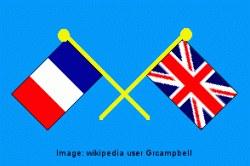By Gordon Barlow.
The New Hebrides (before it went independent as Vanuatu) was a fascinating place. This archipelago in the South Pacific was and is populated by ethnic Melanesians, with a scattering of Polynesians – biologically related, very distantly – to Australian aborigines and native Hawaiians, respectively. Plus a few ethnic Europeans on the fringes, stealing slaves for Australia’s sugar farms (until 1901) or operating coconut plantations, or trading.
In the 1970s, the two nations made half-hearted attempts to establish an offshore tax-haven (paradis fiscal, in French). Their attempts were thwarted by the inadequacy of international communications. The overseas phone service was an antiquated radio link. (“Do you copy?” “Roger; wilco.” “Foxtrot Uncle Charlie…” “Over and out!”) We were connected to the world via an undersea cable to Australia during the scheduled British sessions, and one to Tahiti during the French sessions. I was once cut off in the middle of an incoherent exchange with a client in New York, when the session changed. I pleaded with the French operator (je vous en prie!), and she kindly gave me an extra three minutes.
There were reckoned to be 113 separate Melanesian languages, some spoken in only one or two villages, and four Polynesian ones. The lingua franca was and is a simple local pidgin called Bislama – described in my August 2013 blog Unexpected Places.
The territory was governed eccentrically by France and Britain in tandem – not in any Euro-bullying fashion but in cordial partnership with the local village chiefs. The European powers had only invaded in the first place, in the late 1800s, in order to forestall Germany’s presumed intentions. Their later governance concentrated mainly on the affairs of all non-native traders, visitors and residents.
When the Christian conquerors arrived, they stopped the traditional practices of head-hunting, cannibalism, and wearing no clothes, and tried manfully to stop domestic violence and revenge killings. The Native Code of the Islands (explained in my Aiding and Abetting Adultery, November 2012), negotiated by the two European administrators and the village chiefs, put the punishment of violent crimes into the hands of the Europeans. Offenders were prosecuted in The White Man’s courts, and served time in The White Man’s jails.
The British jail was a source of wonderment for us British expats. The rickety fence was designed (deliberately) not to keep prisoners inside but to keep their families outside. Why would anybody bother to escape, when his village chief would only send him back? Except on special occasions, naturally.
At one village wedding, a British Magistrate friend of mine caught sight of a prisoner he had sent to jail earlier that day. “I carefully didn’t catch his eye, and he carefully kept out of my way,” my friend told me. “Neither of us wanted to spoil the party. No harm done. He took himself back to jail before morning. I did check that.”
What is now called “community service” was part and parcel of jail sentences. Work-gangs of twenty men (violent offenders all) swarmed up and down the town streets armed with sickles and machetes, under the benign supervision of an unarmed native policeman. A chain-gang without chains…
Because old habits die hard, the jail was always full. So there was always a waiting-list of sentenced offenders who had been sent home to their villages to await official recalls by the government radio station. The station was on the air three times a day – half an hour in each of English, French and Bislama, each time: news, followed by public announcements. “This message is for Henry Bong, believed to be (…!) on Malekula. Please meet the Motor Vessel Maskelyne at the jetty on Saturday morning. On arrival in Vila, report to the jail to commence your sentence. Also, Peter Vatu on Erromango, please meet the Maskelyne at about noon on Saturday –” [and so on until the half hour was up].
And, wonderfully, they all did report, unless they were severely sick or injured, or had a wedding to attend… I don’t know what they did if they didn’t know where the jail was, when they got to Vila. Asked a policeman, I suppose.
© Gordon Barlow 2014 All rights reserved.
